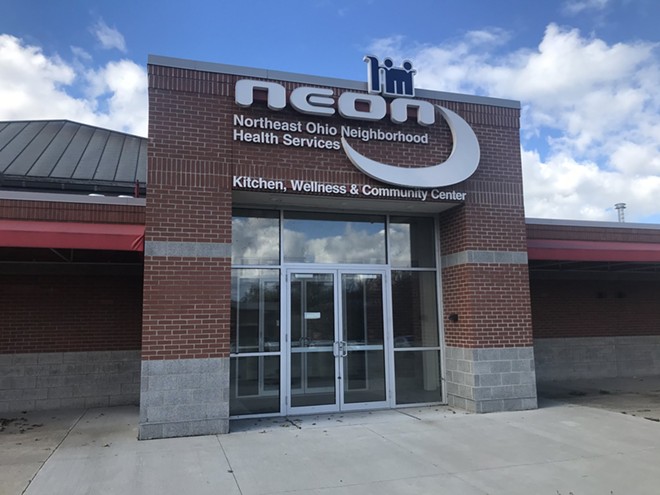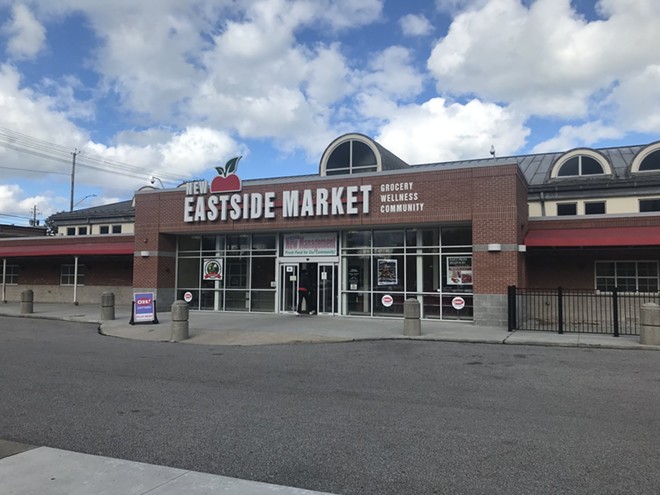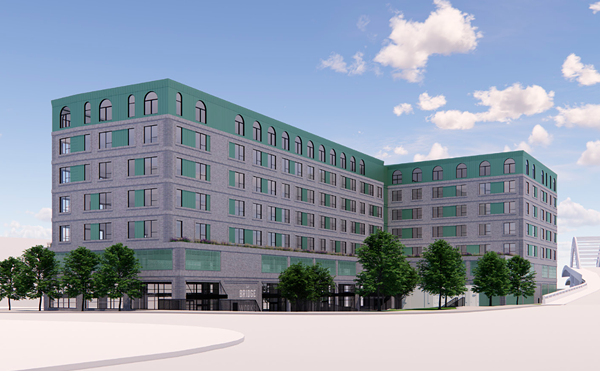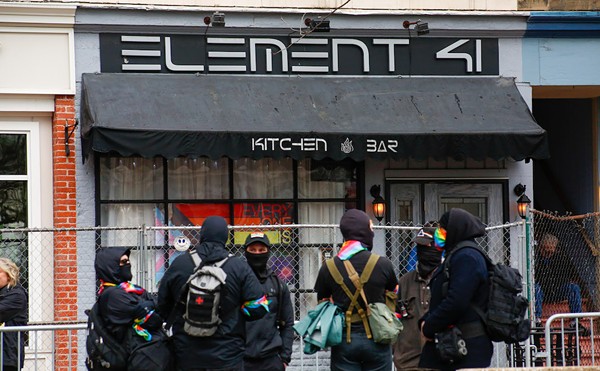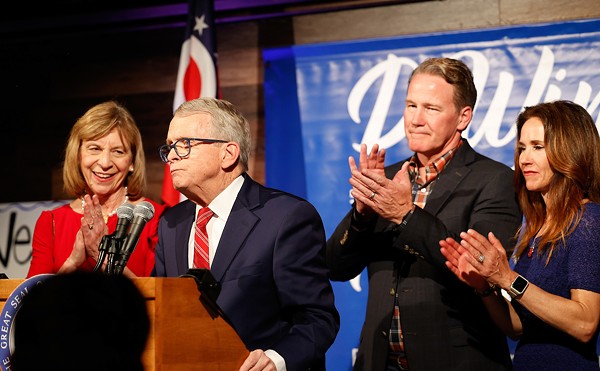Cleveland’s ARPA Budget Includes $2 Million for Problem-Plagued NEON Health Services
By Lee Chilcote, The Land on Wed, Nov 24, 2021 at 10:25 am
[
{
"name": "Ad - NativeInline - Injected",
"component": "38482495",
"insertPoint": "3",
"requiredCountToDisplay": "5"
},{
"name": "Real 1 Player (r2) - Inline",
"component": "38482494",
"insertPoint": "2/3",
"requiredCountToDisplay": "9"
}
]
Originally published by The Land. Republished here with permission.
Behind a six-foot, wrought iron fence on Payne Avenue near East 55th Street sits the headquarters of Northeast Ohio Neighborhood Health Services (NEON), a federally qualified healthcare center (FQHC) that serves some of Cleveland’s poorest neighborhoods. It would be easy to drive by the building — it doesn’t have a sign except for the name of the organization subtly etched into black granite on its nondescript facade.
The metal security screens on the windows, presumably meant to deter intruders, also prevent anyone on the outside from looking in. And perhaps with good reason: According to recent audits, the organization may be on the brink of collapse, even as its CEO, Willie Austin, earned $501,964 in 2019. That’s more than 20 times what a typical NEON patient makes annually and $300,000 more than the annual salaries of CEOs of two other FQHCs in Cleveland, Care Alliance and Neighborhood Family Practice.
Now, NEON is requesting $2 million from the city’s American Rescue Plan Act (ARPA) budget to provide community health programming and repair the Hough Medical Center, which suffered a devastating fire in May of this year. Yet even as Mayor Frank Jackson’s outgoing administration has backed this request in its most recent ARPA budget, NEON has been running up deficits, defaulting on its debts, and losing patients and staff for years, leading concerned employees to question the future of the organization.
The Land recently interviewed NEON staff members, who agreed to be quoted anonymously for fear of losing their jobs, who said that NEON is bleeding staff. Currently, NEON only has one-third of the nurses that it once had, they said.
“Every department is in a deficit trying to keep up,” a staff member told The Land, adding that having enough staff to cover positions has become a major issue. “People are leaving because everyone else pays better and treats you better.”
The Land contacted NEON to request an interview for this story, but did not receive a response. It also submitted a public information request to the city of Cleveland asking for additional information about how the $2 million for NEON would be spent, but did not hear back. Nonetheless, a trail of public documents shows an organization mired in trouble.
According to a recent audit, NEON’s losses stem in part from a lawsuit from a former employee who alleged wrongful termination. After NEON lost its appeals, that lawsuit ultimately cost the agency more than $1.3 million. The employee, James O’Donnell, was fired after questioning invoices by Arthur Fayne, a NEON board member and head of a consulting firm, Business Development Concepts, who was hired to manage The New Eastside Market project. On December 7, 2020, Fayne was indicted for allegedly embezzling $855,000 from the project. The case was still being prosecuted as of the publication date of this story.
Moreover, according to records obtained by The Land from the Health Resources and Services Administration (HRSA), NEON lost one-third of its patients from 2016-2020, dropping from 31,804 patients served in 2016 to 21,605 patients in 2020. An internal memo shared at a NEON staff meeting and obtained by The Land says that NEON suffered from “consistent decline over five years with no periods of incremental growth.” The agency has lost 47% of its client base or 10,199 patients in the past five years.
Additionally, the memo states, “We also received only two quality recognition badges: PCMH (patient-centered medical home) and COVID-19 data reporting (for the weekly HRSA reports).” HRSA provides funding to agencies that provide healthcare to vulnerable groups, including low-income communities of color in Cleveland such as those served by NEON.
The problem, according to staff members, is that NEON does not provide appropriate staffing or high levels of care and is losing patients to other FQHCs in the marketplace, including Neighborhood Family Practice, Care Alliance, and Signature Health.
The agency, founded in 1967, operates seven clinics in Cleveland and East Cleveland. Yet despite its reputable history, in recent years NEON has operated with large deficits. The agency lost $915,798 in 2019, the most recent tax year available, according to the IRS. The group’s total operating revenues were $24,883,972 during that year. Of that total, $14,214,652 came from contributions and grants, while $10,124,766 came from program service revenue (such as Medicaid reimbursements). In 2018, the organization ran a deficit of $669,722.
Despite these heavy losses, the board of directors gave Austin a $100,000 raise, up from $402,351.
The Land contacted Rev. Rodney Thomas of Imani Temple Ministries, board president of NEON, who did not respond to our interview request.
A troubling audit
A December 31, 2019 audit from BKD certified professional accountants and advisors provides a window into the scope of NEON’s problems. “The accompanying financial statements have been prepared assuming the organization will continue as a going concern,” it says. “The organization has suffered recurring losses from operations and has a working capital deficiency, which raises substantial doubt about its ability to continue as a going concern.”
The audit reveals an organization trying to remain above water, even as it lacks proper financial controls within its own organization.
In 2019, NEON had “an operating loss of approximately $2,089,000 and an overall loss of approximately $2,614,000, in addition to negative cash flows from operations of approximately $2,303,000 and continued decreases in working capital,” the audit from BKD states. At the end of 2019, NEON also had several notes payable and lines of credit that were in default.
Additionally, NEON “entered into multiple agreements to sell its future receivables to third parties at a discount” at this time, the audit states, incurring interest of around $745,000 in 2019.
According to the audit, in 2013, NEON began to pursue management of The New Eastside Market project. NEON’s for-profit subsidiary, Community Integrated Services (CIS), contracted with Arthur Fayne’s company Business Development Concepts, LLC (BDC) to manage it. According to the 2019 audit, CIS paid BDC $3,057,000 in 2018 and $718,000 in 2019.
According to a Dec. 4, 2020 press release from the U.S. Attorney’s office from the Northern District of Ohio, Fayne allegedly embezzled nearly $1 million from The New Eastside Market project. He submitted invoices to CIS/NEON to pay the contractor, then used the funds the pay his gambling debts instead. According to the release, Fayne is “accused of accessing some funds from BDC at a casino and losing approximately $1 million on separate occasions.”
Additionally, during this time, NEON was a defendant in a lawsuit that asserted wrongful termination of former chief financial officer James O’Donnell, ultimately costing the organization approximately $1,365,000 as part of the initial judgment. O’Donnell passed away in December 2020.
In 2020, the organization received a $3,642,800 forgivable loan from the Paycheck Protection Program as a result of the CARES Act. The agency also received $216,000 in provider relief funds and $1,588,000 in supplemental health center funding awards.
In April of 2020, NEON also secured two mortgages for $8,500,000 and $500,000. According to the audit, proceeds from the loans were used to pay bills, pay off outstanding debts, and pay off remaining balances associated with the advances from sales of receivables.
The agency was without a chief financial officer for six months in 2019, resulting in “a critical lack of detailed supervisory review of certain month-end estimate calculations, preparation of certain subsidiary general ledger information, and other key schedules prepared during the financial statement close process,” according to the audit. The agency sold off more receivables to third parties at a discount in April 2020, suggesting that its troubles are still far from over.
The New East Side Market
NEON was selected as developer of The New Eastside Market in 2015, and subsequently leased the property from the city for $1 per year in 2015. Prior to that time, the city had spent its own resources stabilizing the property and developing a request for proposals. NEON responded to the RFP and was ultimately selected as the developer and operator of the new market.
“We’re interested in holistic health — housing, jobs, nutrition,” Austin told Crain’s Cleveland Business in 2015, explaining why a healthcare organization was opening a grocery store. “There’s no place in the area to get fresh food. One constituent told Councilman Kevin Conwell, ‘I’d be happy if I could just buy an apple.’ That really illustrates the problem that we’re having.”
In addition to the $1 per year lease from the city, the project was also supported by a $750,000 capital grant from the State of Ohio and $166,000 from the City of Cleveland. The city also gave the market a 75 percent tax abatement for 15 years on improvements made to the property, including all-new plumbing, electrical, and roofing. When it ran into cost overruns in 2018, the city provided an additional $500,000 recoverable grant to The New Eastside Market.
In a press release when The New Eastside Market held its grand opening in 2019, Mayor Frank Jackson said: “Cleveland is proud to be part of the Eastside Market’s historic renovation serving the people of Glenville, Collinwood and surrounding communities. The city has invested in this project to help ensure residents can have access to a full-service grocery store.”
Yet while the market had a goal of providing fresh food and wellness services to an area that lacks a full-service grocery store, it hasn’t lived up to its promises. As the project progressed, the initial budget of $3.5 million swelled to $6.7 million with cost overruns and delays. NEON pledged to open a health clinic, demonstration kitchen, and hub for entrepreneurs, but those never materialized, despite NEON’s prominent signage on the outside of the building.
According to Cuyahoga County tax records, the city now owes $101,067.86 in taxes on the property. The total includes penalties of more than $13,000 due to lack of payment for 2019 taxes that were owed in 2020. Lou Gentile, a commercial appraiser with Cuyahoga County, said that the property is not exempt from paying taxes because the grocery store is a for-profit business. The city did not reply to an interview request seeking comment on the issue.
Brad Rosselot with Mazzullo’s Market in Bainbridge and Aurora, who was originally involved in running the The New Eastside Market project, also did not return two phone calls seeking comment. The Land visited The New Eastside Market and spoke with manager Alonzo Barker, who is also the Chief Information Officer at NEON, but Barker declined to be interviewed.
Ward 9 council member Kevin Conwell told The Land that he believes in the project, which is in his ward, but that he’s concerned it may be in trouble. “They broke ground in 2016, and they had a ribbon cutting two years later,” he said. “But they still haven’t completed what they said they would complete. They’re struggling. The store is not resonating with the community.”
More financial troubles
One of the reasons why NEON became mired in debt in recent years is because it lost an expensive lawsuit filed by former CFO James O’Donnell. Court documents reveal that O’Donnell had tried to warn NEON CEO Willie Austin about Fayne’s allegedly fake invoices, and yet Austin subsequently fired O’Donnell for insubordination.
In 2016, NEON was sued by O’Donnell, who filed an age discrimination claim after he was fired. O’Donnell was 60 years old when he was let go, and he was replaced by 35-year-old George Voss. O’Donnell also claimed that he was fired for asking “tough questions” about the finances of several projects NEON was funding through CIS, including The New Eastside Market.
NEON, for its part, claimed that O’Donnell was terminated due to insubordination and disrespect. O’Donnell won his suit for age discrimination in April 2020, and was awarded $1,253,738.50 in back pay, compensatory damages, and interest. NEON lost its subsequent appeals.
According to court documents, O’Donnell tried to bring up Fayne’s invoices with Austin. In a May 25, 2016 email, O’Donnell wrote to Austin, “It is notable to see that the same transactions requested from Arthur yielded no actual proof that the payments were made to his subcontractors, only invoices, that quite frankly any eighth grader could recreate on a printer! Let me speak frankly, when you divert a million dollars a year to an unproven entity acting on your behalf, there is going to be heightened scrutiny. We are in the second year of million dollar losses, that nonprofit Board members may not fully comprehend? A Board member’s responsibility of ‘Duty of Care’ will be questioned by outside reviewers.”
To which Austin replied, “Be very careful about the way you communicate with me, especially questioning my intelligence and/or ability to understand something you were not present to hear, question or response [sic]. Insolence seems to be something which you hold in high regard. However, you are not going to address me any way you like without there being consequences.”
On Jan. 9, 2017, Austin fired O’Donnell and had him escorted from the building by another staff member and a security officer.
“We’re all in despair”
Conwell said that he knows NEON is struggling financially, but that he does not want them to go under because they provide important healthcare services to the community. “NEON deals with a lot of healthcare inequality in our region,” he said. “They have an up close view of the community. If NEON goes under, then that’s going to hurt our community.”
“They’re in the fabric of the community in a way that Cleveland Clinic is not in the fabric,” he added, citing health disparities faced by Black and low-income communities.
Speaking at the Nov. 8th city council meeting, Ward 7 council member Basheer Jones agreed. “If anyone is from Cleveland, you’ll know about the impact that NEON has had on all of us,” he said. “I remember going there as a young boy. Many community members feel uncomfortable going to the large institutions. NEON is a place they trusted.”
The employees who spoke with The Land said they fear the organization will not survive, given its current trajectory. For one thing, they say the organization does not pay competitive wages, and has trouble recruiting and retaining staff because of poor working conditions. Additionally, NEON’s facilities are in desperate need of an upgrade, these staff say.
According to one staffer, NEON cannot compete with the Cleveland Clinic and other providers because it pays medical assistants and licensed practical nurses $4-8 less per hour. The staffer said they hadn’t had a raise in three years and had been forced to take on other responsibilities, like serving as a door monitor for COVID-19 testing, that aren’t part of their jobs.
Another staff member claimed NEON’s facilities are outdated. “Before the Hough fire, we had a radiology department, and the mammogram machine was so old, it was always breaking down,” the staffer said. “Other times, the equipment breaks down and they can’t find parts, because it’s so old it’s obsolete. Then when the equipment gets shut down, we’re told there’s no money for things.”
“We’re all in despair, a real loss of hope,” said the individual, who is looking for another job.
NEON receives funding from the HRSA Health Center Program, and their current project period runs through December 31, 2021. Spokesperson Scott Kodish said NEON’s application for future funding is currently under review.
Nonetheless, several east side council members said they are supporting NEON’s current ARPA request for $2 million introduced at the Nov. 8 council meeting. Conwell said that he supported the request because it would be used to provide medical care to the community. Ward 10 council member Anthony Hairston, whose ward includes the St. Clair Superior neighborhood where NEON has a health care center on Norwood Avenue, also supports the organization, though he was not aware of the ARPA request.
At the Nov. 8 city council meeting after the legislation was introduced, current Ward 7 council member Basheer Jones spoke to his colleagues about why he supported NEON and urged them to follow suit.
“If anyone’s from Cleveland, you’ll know about the impact that NEON health center has had on all of us,” he said. “I’m asking all of my colleagues for your support. Let’s rebuild NEON. It truly has had a phenomenal impact on the community.”
SCENE Supporters make it possible to tell the Cleveland stories you won’t find elsewhere.
Become a supporter today.
Scroll to read more Cleveland News articles
Newsletters
Join Cleveland Scene Newsletters
Subscribe now to get the latest news delivered right to your inbox.

